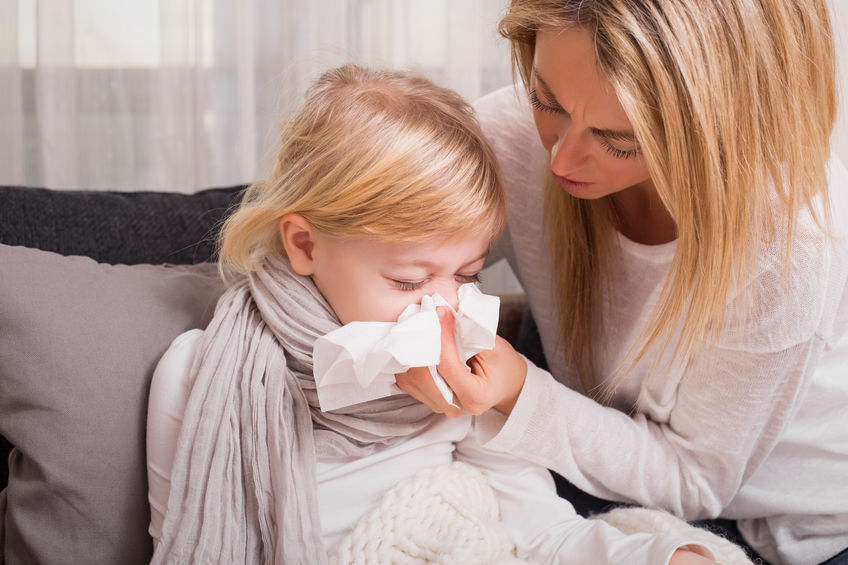During the cold winter months it can feel like cold and flu symptoms are never ending when you have young kids. Luckily for us Florida is not so bad as other parts of America like New England or Chicago. Sometimes it’s hard to know whether your child has a cold or the flu. We understand it’s tough to know when to make an appointment with the pediatrician so here are some tips that might help you differentiate the two.
The Common Cold
Kids can experience up to 10 colds in the first 2 years alone, with even more once kids begin daycare or preschool, according to the American Academy of Pediatrics. Colds spread quickly among young children and especially in school and daycare settings. Colds can spread through coughing or sneezing into the air or onto the hand and then touching other people. When a healthy person then touches the cold germs and then touches their own mouth or nose, the cold can spread.
A cold is characterized by the following symptoms:
• Coughing
• Runny nose
• Low-grade fever (101- 102)
• Sneezing
• Decreased appetite
• Fussiness
A cold or Upper Respiratory Infection is a viral illness that does not need to be treated with medication and in general, symptoms subside on their own after 7-10 days. The AAP does not recommend the use of cough or cold medication in children. Instead of cough medication, try using a humidifier or sit in the bathroom with a warm shower running. Breathing in the steam can help to loosen mucus. Honey or warm honey lemon water can also coat the throat and help with coughing. (Note: do not give honey to children under 1 year).
Preventing colds
It is best to keep babies away from anyone with cold symptoms, especially in the winter time. Teaching older kids to cover coughs and sneezes along with good hand-washing can help prevent spreading germs. Washing hands with warm soapy water for 20 seconds, or the time it takes to sing “Happy Birthday”, can help to prevent the spreading cold and flu germs.
When to call the doctor
If your child is experiencing difficulty breathing, ear pain, pus on tonsils, or temperature over 102, call your pediatrician. While not common, some colds can turn into more severe illnesses like croup or bronchiolitis, which can require further treatment. Always call the doctor if young babies 3 months of age or younger are experiencing illness.
Flu
The Flu, short for Influenza is more severe than a cold and in many cases can be prevented with the flu vaccine. Flu season typically starts in the fall and ends in the spring. The flu spreads similar to a cold, through the air via cough or sneeze or by touching contaminated surfaces (like door knobs, counter tops, or toys) and then touching the mouth or nose.
Flu symptoms include:
• Fever 101+
• Chills and body aches
• Headache
• Sleepiness
• Sore throat
• Dry cough
• Stuffy or runny nose
Flu symptoms can last up to a week or more. If your child is experiencing flu symptoms, they can be tested for Influenza at the pediatrician’s office. Treatment may include anti-viral medication within 24 hours of the onset of flu symptoms. Rest and plenty of fluid can also be beneficial. Most symptoms will subside after 7-10 days.
Flu Prevention
The flu shot can help prevent the flu or decrease severity of symptoms. It’s especially important for infants, children, pregnant women, and anyone who is at risk to receive the flu vaccine. Like colds, appropriate hand washing can prevent spreading germs.
Have questions or concerns? Call Dr. Saska Sookra. Lifestream Family Medicine wants to be your primary care facility. Contact us to schedule an appointment by clicking this link or calling (941) 755-0433







